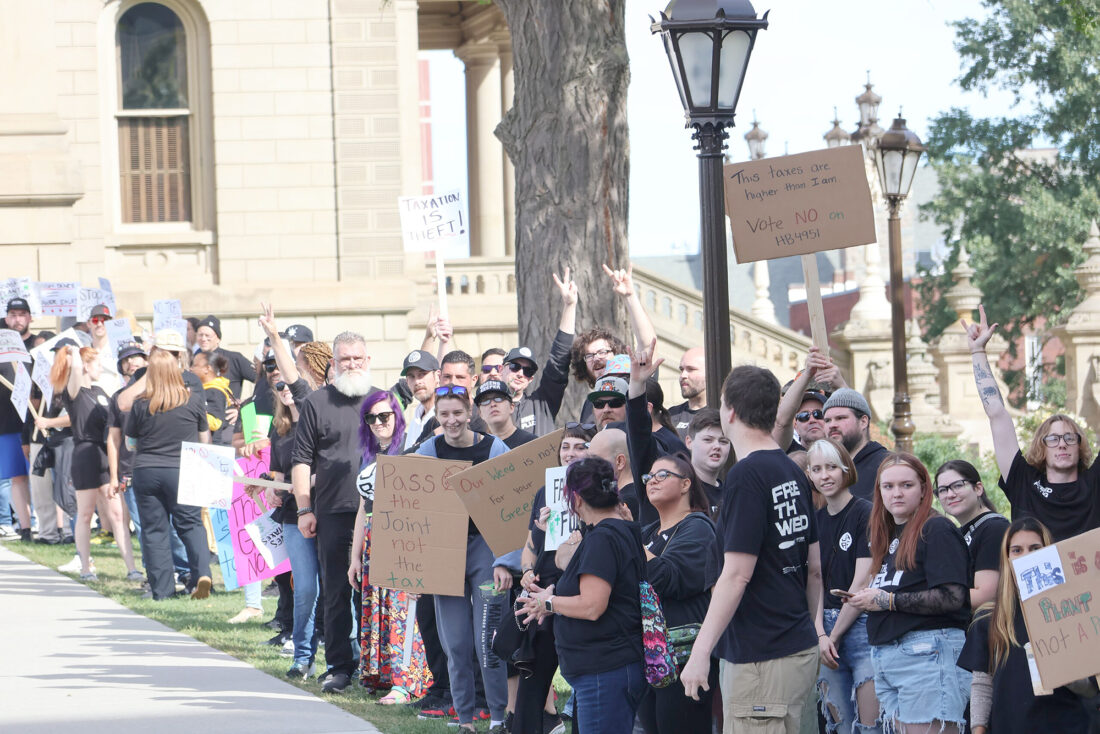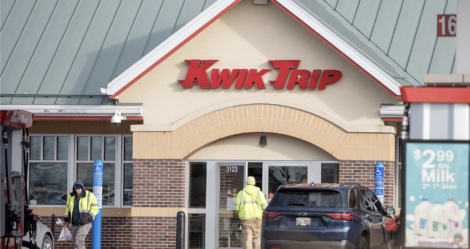Critics warn Michigan’s 24% pot tax could crush small retailers and hurt patients

Representatives from the cannabis Industry set up a procession from the Binsfeld Office Building into the Senate in Lansing, cheering on senators as they walk in and urging them to “stay strong” in opposition to the then-proposed 24% tax on cannabis put forth Oct. 2 by the Michigan House of Representatives. (Kyle Davidson/Michigan Advance)
As state budget negotiations drew to a close last week, members of the Democratic-led Senate and the Republican-led House were able to reach a deal to bring in additional funding for road repairs through a plan that drew much debate: levying additional taxes on marijuana.
Hundreds of individuals from the cannabis industry came out in opposition to the proposal last week, gathering on the Capitol lawn and lining the halls of the building as lawmakers worked to finalize the state budget.
While the policy won support from both sides of the aisle, its detractors were similarly bipartisan as some lawmakers warned that an additional 24% tax on wholesale marijuana could carry a host of issues, from smothering small businesses to expanding the black market, and even opening the state up to a potential constitutional challenge.
Although Michigan Gov. Gretchen Whitmer put her pen to the new tax law Tuesday, the future of the law has already been challenged, with the Michigan Cannabis Industry Association filing a complaint the same day, arguing the law improperly alters the law initiated by voters when they agreed to legalize marijuana in 2018.
Navigating the new tax
Under the new policy, which is scheduled to take effect on Jan. 1, 2026, the first sale or transfer between a marijuana business and a retailer is subject to a 24% tax. If a retailer has cultivated or processed its own marijuana, the Michigan Department of Treasury will collect a tax based on the wholesale price on the total amount of marijuana the retailer cultivates and processes for sale.
Denise Pollicella, an attorney at Omnus Law who largely works with clients in the cannabis industry, said the details on how the tax will be administered — including the tax rate for companies who produce their own retail product — will be fleshed out by the Department of Treasury as the law takes effect.
She noted that the tax applies to products in the recreational adult-use industry, not CBD, hemp or medical marijuana.
However, Pollicella emphasized that the tax will touch each part of the industry, as marijuana businesses raise their prices to compensate for the additional tax.
If the price of recreational marijuana increases significantly in order to cover the price of the tax, there will come a time when it is significantly less expensive for consumers to get their marijuana on the black market, Pollicella said
“One of the biggest complaints and concerns of the cannabis industry since 2018 is that once marijuana was legalized in Michigan, law enforcement basically either stopped altogether trying to enforce unregulated marijuana trafficking, or they were stopped from enforcing it because there weren’t enough teeth left in the laws to allow prosecutors to actually prosecute it,” Pollicella said.
The unregulated market in Michigan never went away, Pollicella said, though it has shrunk and will continue to shrink provided customers have access to a better alternative – such as safe and accessible marijuana.
“Those are the two things we have always fought for. Safe and accessible, meaning, it’s been lab tested so you know it’s not laced with fentanyl or cat hair or mold, you know, it’s not gonna make you sick,” Pollicella said. “And then that it’s accessible, so that a person who really wants to try it or use it can go into a well-lit commercial facility in a commercial district of their municipality, in the daytime and have a safe experience and access a wide variety of marijuana products.”
In an email to the Michigan Advance, Danny Wimmer, a spokesperson for the Department of Attorney General said their office has faced “serious problems” in prosecuting illegal, large-scale marijuana growing operations in the years since recreational marijuana was legalized in Michigan.
“The criminal statutes protecting Michigan residents from these practices are squarely outdated,” Wimmer said, calling the Michigan Regulation and Taxation of Marihuana Act insufficient in punishing illegal grow operations and incompatible with the state’s current legal marijuana landscape.
The department is also aware that international criminal organizations are traveling to Michigan specifically to set up shop due to the state’s lax laws on illegal cultivation, Wimmer said.
Alongside concerns about the black market, Pollicella also pointed to the tax burden borne by marijuana businesses.
“If you put more of a tax burden on these companies, and they’re not allowed to renew their licenses, they’re going to start going out of business,” Pollicella said. “If there are no more businesses in this industry, who in the heck are you going to collect the taxes from?”
Because marijuana remains illegal at the federal level, marijuana business owners are barred from taking advantage of tax breaks, save for the cost of goods. Pollicella explained that while that exception helps grow facilities and processing facilities, retailers are taking it on the chin.
Federal law also bars marijuana businesses from receiving bankruptcy protections and insurance rates are often triple what other businesses are charged, Pollicella said.
Additionally, the state already charges a 10% excise tax which is collected at the retailer alongside the state’s 6% sales tax.
“The retail facilities are the ones on very thin margins right now,” Pollicella said. “I already have a lot of clients who are small operators — one or two shops, maybe five — they don’t have the economy of scale, they’re not operating at a big enough scale to withstand this. I mean, they’re already either closing or, you know, planning to close after the first of the year.”
On top of the taxes the industry already pays to the state and their licensing fees, Pollicella said marijuana businesses also face burdensome regulatory fees and fines that can range up to $100,000.
“It’s extraordinarily expensive to be in this industry and have a license,” Pollicella said. “The fact that the House and Senate passed this bill either knowing what kind of burden the industry is already under, or not having the curiosity to find out what kind of burden this industry is under was not responsible.”
The potential impact
Jerry Millen owns the Greenhouse of Walled Lake, the first licensed medical and recreational marijuana dispensary in Oakland County. The shop caters to a more adult clientele, Millen said, with the average age of 44.
“We cater to seniors. We have a lot of 80 and 90 year olds that come in every day,” Millen said.
In an interview with the Advance on Tuesday, Millen pushed back on the notion that the new tax is only hitting “stoners” and “weedheads,” emphasizing the medicinal uses for marijuana.
“I see seniors every day that can’t sleep or have arthritic pain. I work with cancer patients,” Millen said. “I’ve seen this product as a medicine for 15 years now, and I wouldn’t have believed it myself. I didn’t when I first started, until I saw and I met these people.”
Millen slammed the 24% excise tax as a money grab from the state, which will appear as price gouging to customers who are unaware of the tax.
Imagine shopping at a dispensary with a 16% tax on marijuana on your receipt, and then going in the next, with a 40% tax on your bill, Millen said.
“You’re gonna lose your mind,” he said.
However, the 24% tax won’t appear on the receipt, as the cost is hidden behind the retailer, Millen said.
Kevin May, part owner of Glacier Cannabis, a craft cannabis cultivator in Manchester, Mich., said there’s no way for wholesalers to eat that cost, leaving dispensaries to pick up the tab and pass the cost along to the customer.
Pollicella, Millen and May all agreed, when it comes to the new tax, the customer is the one who will feel the impact.
“That’s not because the growers or the dispensaries are making another penny, they’re still not making anything. It’s still a struggling industry that way. Because it’s already oversaturated, people are about to go out of business,” May said.
Although patients with a medical marijuana card do not have to pay the 10% tax on marijuana sales at the dispensary, Millen said many people have gotten rid of their card after the legalization of recreational marijuana in the state. He warned that a 24% increase in price could bar some medical marijuana patients from getting what they need.
While Millen said his older clientele are not the type to turn to the black market, a resurgent black market creates concerns for those who are underage.
“Even the people that are against marijuana should have a problem with this, because at the end of the day, marijuana is legal, it’s going to be sold,” Millen said. “But now that the black market can resurge, that means your kids are probably going to get a hold of some black market products that are going to be unsafe. So you should be going against this tax, too.”
The new tax will also cost people jobs, Millen said, with “mom and pop” growers, processors and dispensaries in threat of going out of business.
While there are roughly 47,000 cannabis industry jobs in the state, Pollicella said there are easily another 40,000 that help support the industry, including accountants, attorneys, tax preparers, real estate developers and whole banking divisions.
Although May and Pollicella disagreed with the notion that the tax would wholly decimate the industry within the state, both agreed that it would likely result in a consolidation of the industry.
“There are some people in this industry who are wealthy, but I will also say this: a majority of the people in this industry haven’t even made their money back yet,” Pollicella said, emphasizing that the tax increase will cost people their livelihood during an uncertain time when people are already struggling to find jobs.
While there will be people laid off in the short term, May said those people will still be able to find jobs as successful companies pick up real estate and work to fill the holes left in the market.
Though some opponents of the tax raised concerns that an increase of prices could drive away customers in communities on the border of the state, May disagreed, noting that people who buy their weed in Michigan have enjoyed the cheapest prices in the nation.
In border states such as Ohio, prices are still high, the product is not as high quality and it’s sold in strange quantities, May said.
“I still believe the border stores are going to boom,” May said. “If you’re weak and you’re not operating properly and you’re having a hard time with your costs staying in line, you’re going to have a real big issue now.”
———
Michigan Advance is part of States Newsroom, a national 501(c)(3) nonprofit. For more, go to https://michiganadvance.com.





